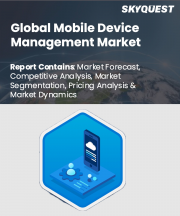
|
시장보고서
상품코드
1898666
모바일 디바이스 관리 시장 규모, 점유율, 성장 분석 : 컴포넌트별, 운영체제별, 도입 모드별, 조직 규모별, 업계별, 지역별 - 업계 예측(2026-2033년)Mobile Device Management Market Size, Share, and Growth Analysis, By Component (Solutions, Services), By Operating System (IOS, Android), By Deployment Mode, By Organization Size, By Vertical, By Region - Industry Forecast 2026-2033 |
||||||
세계의 모바일 디바이스 관리(MDM) 시장 규모는 2024년에 184억 달러로 평가되며, 2025년 228억 7,000만 달러에서 2033년까지 1,303억 3,000만 달러로 성장할 전망입니다. 예측 기간(2026-2033년)의 CAGR은 24.3%로 예측됩니다.
세계 모바일 기기 관리(MDM) 시장은 원격 근무 증가, 기업내 모바일 사용 확대, 강력한 보안에 대한 수요 증가로 인해 MDM 서비스 도입이 확대되면서 괄목할 만한 성장이 예상됩니다. 또한 기업은 규제 준수를 보장하는 동시에 기업용 디바이스에 대한 관리 강화를 모색하고 있습니다. 하지만, 시장에는 과제도 존재합니다. 지역별 규제 차이와 법적 복잡성으로 인해 세계 비즈니스에서 컴플라이언스 대응이 어려운 점을 꼽을 수 있습니다. 또한 기술의 급속한 발전으로 인해 조직은 진화하는 기술과 프로세스에 적응하기 위해 고군분투하고 있습니다. 그럼에도 불구하고 IoT, 머신러닝, 인공지능과 같은 신기술의 통합은 MDM의 기능 강화와 시장의 지속적인 확장을 촉진할 수 있는 큰 기회를 제공합니다.
세계 모바일 기기 관리 시장 활성화 요인
BYOD(Bring Your Own Device) 정책의 도입 확대와 원격 근무 증가로 조직에서 다양한 모바일 기기를 효과적으로 보호하고 관리할 필요성이 크게 증가하고 있습니다. 모바일 기기 관리(MDM) 솔루션은 개인 소유의 기기와 회사 소유의 기기 모두 기업 리소스에 안전하게 액세스할 수 있도록 지원합니다. 또한 이러한 솔루션은 기밀 데이터 보호, 기기 사용량 모니터링, 용도 권한 규제에 중요한 역할을 하고 있으며, 이러한 요소들이 결합되어 시장 수요 증가를 촉진하고 있습니다. 기업이 안전하고 효율적인 모바일 환경을 구축하고자 하는 가운데, MDM은 업무 전략에 있으며, 필수적인 요소로 자리 잡고 있습니다.
세계 모바일 기기 관리 시장 성장 억제요인
모바일 디바이스 관리 솔루션의 도입과 운영 관리는 특히 다양한 OS와 디바이스를 사용하는 조직에게 큰 도전이 될 수 있습니다. 이러한 복잡성으로 인해 전문 지식과 추가 리소스가 필요한 경우가 많아 일부 기업이 도입을 주저하는 요인이 될 수 있습니다. 결과적으로 이러한 장벽은 전체 모바일 기기 관리 시장의 성장을 저해하는 요인이 될 수 있습니다. 기업은 광범위한 지원과 관리 능력이 필요한 시스템에 대한 투자를 주저할 수 있기 때문입니다. 이러한 복잡성을 해결하는 것은 광범위한 도입을 촉진하고 시장 확대를 가속화하기 위해 필수적입니다.
세계 모바일 기기 관리 시장 동향
세계 모바일 디바이스 관리(MDM) 시장은 기존 모바일 플랫폼(iOS, 안드로이드, 기업용 리눅스 배포판 등)을 넘어 다양한 OS를 지원하는 방향으로 큰 전환이 이루어지고 있습니다. 이러한 진화는 점점 더 복잡해지는 IT 환경에 대응할 수 있는 유연하고 종합적인 MDM 솔루션에 대한 수요 증가를 반영하고 있습니다. 주요 동향으로는 직관적인 사용자 인터페이스 도입, 기존 IT 인프라와의 원활한 통합, 강화된 셀프서비스 기능 등을 꼽을 수 있으며, 사용자와 IT 관리자 모두를 지원합니다. 조직이 멀티 디바이스 전략을 채택하는 가운데, MDM 솔루션은 강력한 보안, 운영 효율성 향상, 사용자 경험 개선을 보장하는 방향으로 계속 진화하고 있습니다.
자주 묻는 질문
목차
서론
- 조사의 목적
- 조사 범위
- 정의
조사 방법
- 정보 조달
- 2차와 1차 데이터 방법
- 시장 규모 예측
- 시장 전제조건과 제한
개요
- 세계 시장 전망
- 공급과 수요 동향 분석
- 부문별 기회 분석
시장 역학과 전망
- 시장 규모
- 시장 역학
- 촉진요인과 기회
- 억제요인과 과제
- Porter의 산업 분석
주요 시장 인사이트
- 주요 성공 요인
- 경쟁의 정도
- 주요 투자 기회
- 시장 에코시스템
- 시장의 매력 지수(2025년)
- PESTEL 분석
- 거시경제 지표
- 밸류체인 분석
- 가격 분석
- 특허 분석
- 기술 분석
- 사례 연구
- 고객 및 구매 기준 분석
세계의 모바일 디바이스 관리 시장 규모 : 컴포넌트별 & CAGR(2026-2033)
- 솔루션
- 디바이스 관리
- 애플리케이션 관리
- 보안 관리
- 기타 솔루션
- 서비스
- 전문 서비스
- 컨설팅 서비스
- 도입 서비스
- 지원 서비스
- 매니지드 서비스
세계의 모바일 디바이스 관리 시장 규모 : OS별 & CAGR(2026-2033)
- iOS
- Android
- Windows
- macOS
- 기타 운영체제
세계의 모바일 디바이스 관리 시장 규모 : 배포 모드별 & CAGR(2026-2033)
- 클라우드
- 온프레미스
세계의 모바일 디바이스 관리 시장 규모 : 조직 규모별 & CAGR(2026-2033)
- 대기업
- 중소기업
세계의 모바일 디바이스 관리 시장 규모 : 업계별 & CAGR(2026-2033)
- BFSI
- 통신
- 소매
- 헬스케어
- 교육
- 운송·물류
- 정부·공공 부문
- 제조업 및 자동차 산업
- 기타 업계
세계의 모바일 디바이스 관리 시장 규모 & CAGR(2026-2033)
- 북미
- 미국
- 캐나다
- 유럽
- 독일
- 스페인
- 프랑스
- 영국
- 이탈리아
- 기타 유럽 지역
- 아시아태평양
- 중국
- 인도
- 일본
- 한국
- 기타 아시아태평양
- 라틴아메리카
- 브라질
- 기타 라틴아메리카 지역
- 중동 및 아프리카
- GCC 국가
- 남아프리카공화국
- 기타 중동 및 아프리카
경쟁 정보
- 상위 5사의 비교
- 주요 기업의 시장 포지셔닝(2025년)
- 주요 시장 기업이 채택한 전략
- 최근 시장 동향
- 기업의 시장 점유율 분석(2025년)
- 주요 기업의 기업 개요
- 기업의 상세
- 제품 포트폴리오 분석
- 기업의 부문별 점유율 분석
- 매출의 전년대비 비교(2023-2025년)
주요 기업 개요
- Microsoft Corporation(United States)
- IBM Corporation(United States)
- BlackBerry Limited(Canada)
- SAP SE(Germany)
- Cisco Systems, Inc.(United States)
- Ivanti, Inc.(United States)
- SOTI Inc.(Canada)
- ManageEngine(Zoho Corporation)(India)
- 42Gears Mobility Systems Pvt Ltd.(India)
- Mitsogo Inc.(United States)
- Scalefusion(Promobi Technologies)(India)
- Hexnode Technologies Pvt Ltd.(India)
결론과 제안
KSA 26.01.15Global Mobile Device Management Market size was valued at USD 18.4 Billion in 2024 and is poised to grow from USD 22.87 Billion in 2025 to USD 130.33 Billion by 2033, growing at a CAGR of 24.3% during the forecast period (2026-2033).
The global Mobile Device Management (MDM) market is poised for notable growth, fueled by the increasing adoption of MDM services driven by the rise of remote work, heightened mobile usage in enterprises, and an escalating need for robust security measures. Additionally, businesses are seeking improved management of corporate devices while ensuring regulatory compliance. However, the market faces challenges, including varying regional regulations and legal complexities that complicate compliance for global operations. Rapid technological advancements also pose difficulties, as organizations struggle to adapt to evolving technologies and processes. Nevertheless, the integration of emerging technologies such as IoT, machine learning, and artificial intelligence presents significant opportunities to enhance MDM capabilities and drive continued market expansion.
Top-down and bottom-up approaches were used to estimate and validate the size of the Global Mobile Device Management market and to estimate the size of various other dependent submarkets. The research methodology used to estimate the market size includes the following details: The key players in the market were identified through secondary research, and their market shares in the respective regions were determined through primary and secondary research. This entire procedure includes the study of the annual and financial reports of the top market players and extensive interviews for key insights from industry leaders such as CEOs, VPs, directors, and marketing executives. All percentage shares split, and breakdowns were determined using secondary sources and verified through Primary sources. All possible parameters that affect the markets covered in this research study have been accounted for, viewed in extensive detail, verified through primary research, and analyzed to get the final quantitative and qualitative data.
Global Mobile Device Management Market Segments Analysis
Global Mobile Device Management Market is segmented by Component, Operating System, Deployment Mode, Organization Size, Vertical and region. Based on Component, the market is segmented into Solutions and Services. Based on Operating System, the market is segmented into IOS, Android, Windows, MACOS and Other Operating Systems. Based on Deployment Mode, the market is segmented into Cloud and On-Premises. Based on Organization Size, the market is segmented into Large Enterprises and Small And Medium-Sized Enterprises. Based on Vertical, the market is segmented into BFSI, Telecom, Retail, Healthcare, Education, Transportation And Logistics, Government And Public Sector, Manufacturing And Automotive and Other Verticals. Based on region, the market is segmented into North America, Europe, Asia Pacific, Latin America and Middle East & Africa.
Driver of the Global Mobile Device Management Market
The increasing adoption of bring your own device (BYOD) policies and the rise in remote work have significantly heightened the need for organizations to effectively secure and manage a variety of mobile devices. Mobile device management (MDM) solutions enable both personal and company-owned devices to safely access corporate resources. Furthermore, these solutions play a crucial role in safeguarding sensitive data, monitoring device usage, and regulating application permissions, which collectively fuel the growing demand in the market. As businesses seek to create a secure and efficient mobile environment, MDM becomes essential for their operational strategies.
Restraints in the Global Mobile Device Management Market
The implementation and management of mobile device management solutions can pose significant challenges, particularly for organizations that utilize a diverse array of operating systems and devices. This complexity often necessitates specialized expertise and additional resources, potentially discouraging some companies from embracing these solutions. As a result, this hurdle may hinder the overall growth of the mobile device management market, as businesses may be reluctant to invest in systems that require extensive support and management capabilities. Addressing these complexities is essential for promoting wider adoption and accelerating market expansion.
Market Trends of the Global Mobile Device Management Market
The Global Mobile Device Management (MDM) market is witnessing a significant shift towards supporting a diverse range of operating systems beyond traditional mobile platforms, including various iterations of iOS, Android, and enterprise-specific Linux distributions. This evolution reflects the growing demand for flexible and comprehensive MDM solutions that cater to an increasingly heterogeneous IT environment. Key trends include the implementation of highly intuitive user interfaces, seamless integration with existing IT infrastructures, and enhanced self-service capabilities, empowering users and IT administrators alike. As organizations continue to adopt a multi-device strategy, MDM solutions are evolving to ensure robust security, better operational efficiency, and improved user experience.
Table of Contents
Introduction
- Objectives of the Study
- Scope of the Report
- Definitions
Research Methodology
- Information Procurement
- Secondary & Primary Data Methods
- Market Size Estimation
- Market Assumptions & Limitations
Executive Summary
- Global Market Outlook
- Supply & Demand Trend Analysis
- Segmental Opportunity Analysis
Market Dynamics & Outlook
- Market Overview
- Market Size
- Market Dynamics
- Drivers & Opportunities
- Restraints & Challenges
- Porters Analysis
- Competitive rivalry
- Threat of substitute
- Bargaining power of buyers
- Threat of new entrants
- Bargaining power of suppliers
Key Market Insights
- Key Success Factors
- Degree of Competition
- Top Investment Pockets
- Market Ecosystem
- Market Attractiveness Index, 2025
- PESTEL Analysis
- Macro-Economic Indicators
- Value Chain Analysis
- Pricing Analysis
- Patent Analysis
- Technology Analysis
- Case Studies
- Customer And Buying Criteria Analysis
Global Mobile Device Management Market Size by Component & CAGR (2026-2033)
- Market Overview
- Solutions
- Device Management
- Application Management
- Security Management
- Other Solutions
- Services
- Professional Services
- Consulting services
- Implementation services
- Support services
- Managed Services
Global Mobile Device Management Market Size by Operating System & CAGR (2026-2033)
- Market Overview
- IOS
- Android
- Windows
- MACOS
- Other Operating Systems
Global Mobile Device Management Market Size by Deployment Mode & CAGR (2026-2033)
- Market Overview
- Cloud
- On-Premises
Global Mobile Device Management Market Size by Organization Size & CAGR (2026-2033)
- Market Overview
- Large Enterprises
- Small And Medium-Sized Enterprises
Global Mobile Device Management Market Size by Vertical & CAGR (2026-2033)
- Market Overview
- BFSI
- Telecom
- Retail
- Healthcare
- Education
- Transportation And Logistics
- Government And Public Sector
- Manufacturing And Automotive
- Other Verticals
Global Mobile Device Management Market Size & CAGR (2026-2033)
- North America (Component, Operating System, Deployment Mode, Organization Size, Vertical)
- US
- Canada
- Europe (Component, Operating System, Deployment Mode, Organization Size, Vertical)
- Germany
- Spain
- France
- UK
- Italy
- Rest of Europe
- Asia Pacific (Component, Operating System, Deployment Mode, Organization Size, Vertical)
- China
- India
- Japan
- South Korea
- Rest of Asia-Pacific
- Latin America (Component, Operating System, Deployment Mode, Organization Size, Vertical)
- Brazil
- Rest of Latin America
- Middle East & Africa (Component, Operating System, Deployment Mode, Organization Size, Vertical)
- GCC Countries
- South Africa
- Rest of Middle East & Africa
Competitive Intelligence
- Top 5 Player Comparison
- Market Positioning of Key Players, 2025
- Strategies Adopted by Key Market Players
- Recent Developments in the Market
- Company Market Share Analysis, 2025
- Company Profiles of All Key Players
- Company Details
- Product Portfolio Analysis
- Company's Segmental Share Analysis
- Revenue Y-O-Y Comparison (2023-2025)
Key Company Profiles
- Microsoft Corporation (United States)
- Company Overview
- Business Segment Overview
- Financial Updates
- Key Developments
- IBM Corporation (United States)
- Company Overview
- Business Segment Overview
- Financial Updates
- Key Developments
- BlackBerry Limited (Canada)
- Company Overview
- Business Segment Overview
- Financial Updates
- Key Developments
- SAP SE (Germany)
- Company Overview
- Business Segment Overview
- Financial Updates
- Key Developments
- Cisco Systems, Inc. (United States)
- Company Overview
- Business Segment Overview
- Financial Updates
- Key Developments
- Ivanti, Inc. (United States)
- Company Overview
- Business Segment Overview
- Financial Updates
- Key Developments
- SOTI Inc. (Canada)
- Company Overview
- Business Segment Overview
- Financial Updates
- Key Developments
- ManageEngine (Zoho Corporation) (India)
- Company Overview
- Business Segment Overview
- Financial Updates
- Key Developments
- 42Gears Mobility Systems Pvt Ltd. (India)
- Company Overview
- Business Segment Overview
- Financial Updates
- Key Developments
- Mitsogo Inc. (United States)
- Company Overview
- Business Segment Overview
- Financial Updates
- Key Developments
- Scalefusion (Promobi Technologies) (India)
- Company Overview
- Business Segment Overview
- Financial Updates
- Key Developments
- Hexnode Technologies Pvt Ltd. (India)
- Company Overview
- Business Segment Overview
- Financial Updates
- Key Developments



















